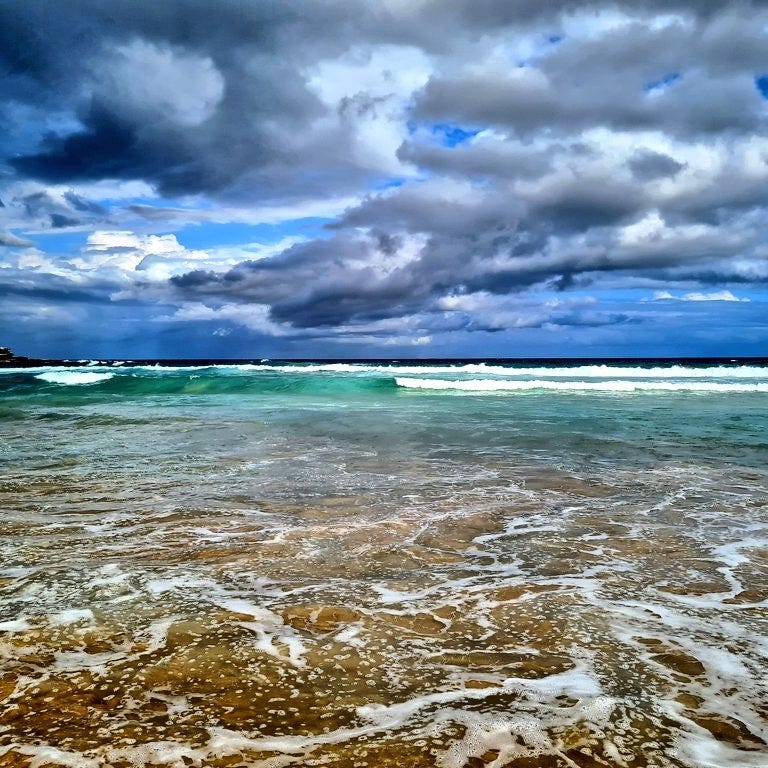Upside Down You Turn Me
The Healing Powers of Australia
I’m about to reach the halfway point of a three-month visit to Sydney. Like all enjoyable experiences, it has caused subjective time to both shrink and dilate at once: many days have been brimming with such experiential richness that they seemed to fill the emotional space of weeks. The corollary of this, as always, is that the weeks have raced past, startlingly fast by contrast, so that I feel like someone on shipboard, gazing out at an endless crinkly blue expanse of calm water, with barely any perception of having changed location, suddenly startled by a bell that announces our arrival into port. My thirst for this place hasn’t even begun to be satiated and yet I’m on the homeward leg of this journey.
I have always had a tendency to cling to people and places, a reluctance to move on. I was heartbroken when I finally left Cambridge, at the end of a long course of undergraduate and graduate studies: I didn’t believe I would ever live in a place of such exquisite beauty again. It was a wrench to leave Bombay, too: a city more vibrant in every sense—louder, more chaotic, more vividly technicoloured, more richly scented with everything from sandalwood to sewage—than anywhere I have lived before or since. The more I love a place (or person), the more I want them in my life forever—and that presents a danger: that I might not be able to enjoy or value something just because it won’t be permanent. I feel that especially acutely right now, as my current household, back in London, is likely to dissolved over the next year and a half, for unavoidable reasons over which I have no influence.
I write this from a deck overlooking a garden fringed with palm trees, which are gently nodding their tousled fronds in the breeze, like a set of Jewish elders davening over their liturgy or a collection of elderly heavy metal fans at a silent disco, headbanging gently to the sound of Black Sabbath emanating from their headphones. The trees are raucous with white parakeets in the early morning and bats soar through the evening darkness. Beyond the egg-yolk and cream blossoms of the frangipani tree two gardens over, the curve of Sydney harbour bridge is etched on the horizon. A little dog in golden-brown ringlets nestles against my shins. I want to live here! But, if I can’t, I want to take something of this away with me and keep it with me, for good.
The epitaph on the tomb in Poussin’s allegorical painting, Et in Arcadia ego, is usually interpreted to mean that death is always present, even in paradise. All good things must end. But I usually like to take it to mean that I (Iona) am also in paradise. Nowhere I go can be Eden because I am always there too, with my anxieties, neuroses, intrusive thoughts, clamorous desires and recalcitrant habits. But, somehow, the person here in Sydney is a different me—less anxious, less fearful, easier on myself. I feel as if I were a snowglobe that had been quietly sitting on a shelf, which has now been turned upside down so that here in the antipodean summer, amid the eucalypts and cockatoos, the glass bubble has been transformed into a winter wonderland of whirling flakes. Or as if I were a kaleidoscope, twisted around to reveal a pattern that was always there, but never viewed before.
This is partly because the Australian reputation for being laidback has—like many clichés—proved accurate. Minor mishaps that would have left my friends back home flustered or annoyed have been met with a shrug. This became clear to me right from the night of my arrival. My host spent an hour waiting for me at the international terminal pick up, while I was at the domestic terminal (having changed planes in Perth) and had missed all his text messages. When we finally found each other, there was not the slightest indication in his manner of anything having gone awry. It was no big deal. A couple of days later, I got completely flummoxed by the bus system and was an hour late to meet a friend (who was waiting for me at a café with a rambunctious new puppy pestering him to leave). I got the same response when we finally met. No worries. Of course, the full range of personality types exists here, as everywhere, but social expectations nudge people in the direction of calm—and that’s contagious.
But it’s more than that. I’ve been treated with such unstinting generosity here, have been received so much like a princess that I see myself differently—more charitably. Perhaps this pumpkin is a coach after all and it can carry me not just right across to the underside of the globe but towards a better future. No one here has asked, “How can you be already in your fifties and yet so unsuccessful in life, with so little to show for yourself?” Not only that, but I have no sense that anyone is even thinking it. And that has stopped me from thinking it, too.
This blog is about new beginnings and I called it The Second Swim because, in 2018, at the age of nearly fifty, I almost drowned in the Indian Ocean. Later that same day, I found a sheltered bay where tourists were snorkelling and took my second swim of the day in safety. Here in Australia, I have been swimming every day: in the small saltwater pool in my hosts’ garden, surrounded by succulents and overlooked by a mango tree, and in the saltwater rock basins that line Sydney’s coast—the famous ocean pools, into which the locals have decanted ladlefuls of their frothy ocean, so you can swim free from rip tides, away from the flouncy waves that make the coastline look like it is wearing a rah-rah skirt, out of reach of the occasional vagabond shark. In the salty water, I am so buoyant that my bottom keeps bobbing up above the surface as I do breaststroke. As my heels kiss gently at the end of each frog kick, I feel as if I were clicking a pair of ruby slippers together. There’s no place like home. There’s no place like home.
Perhaps the best way to reconcile yourself to the prospect of leaving a place you love is to let the trip change you, for good—that way, the place can live on in you, just as a good friend who has died can live on in you because of the way your time with him altered who you are. In his book Staring at the Sun, the psychiatrist Irvin Yalom recounts easing his patients’ fear of death by encouraging them to think about what he calls the rippling effect:
each of us creates—often without our conscious intent or knowledge—concentric circles of influence that may affect others for years, even generations. That is, the effect we have on other people is in turn passed on to others, much as the ripples in a pond go on and on until they’re no longer visible but continuing at a nano level.
I’ve often received a warm welcome when I’ve travelled to a new place, but nowhere has it been warmer than here. Both in the ocean pools and on land, I feel sustained, cradled, effortlessly afloat. Every swim here has been a second swim. And I will carry the ripples with me, back across the skies to London.







What a beautiful reflection. I’d love to go to Australia. My great grandfather is buried there: my grandmother’s family was emigrating from Ireland, but he took ill on the boat and died once they arrived, so the rest of the family went back home. So I feel a connection to the place, and your magnificent words make it all the more alluring!
Hi Iona. I live in Sydney, adore the ocean pools. Nice to hear from an outsider that’s it’s special (though we know it is) and you find the people easy, I agree they are 💙